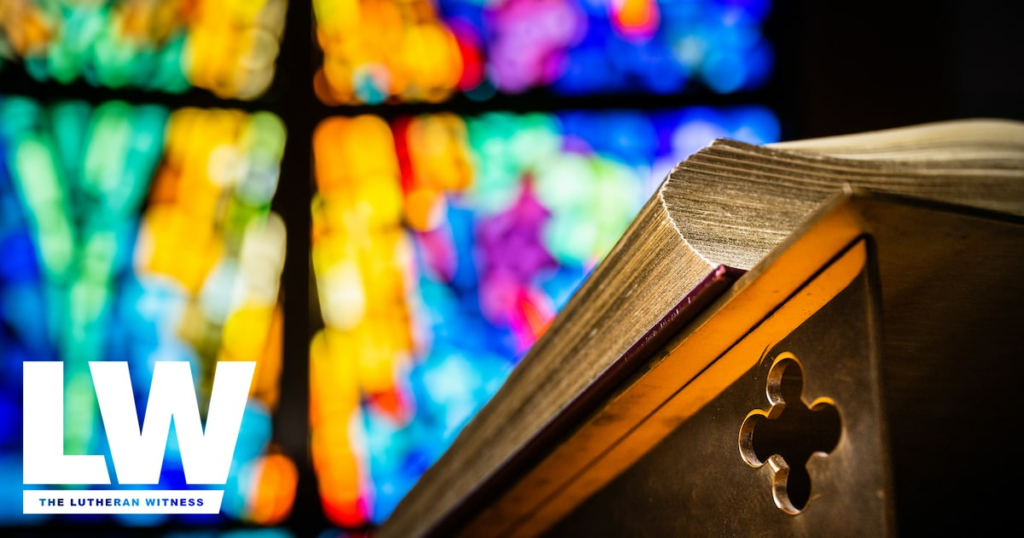by Rev. Dr. David P. Scaer
Polls taken in October show church members are less informed about religion than the non-churched, but we Americans are more often in church than Europeans. Since we are religious, we should engage in talking about what we believe, but where do we start?
Beginning with God is an obvious option. But it’s problematic that Islam, Hinduism, Buddhism and Christianity understand “God” in different ways. Then there are those who off handedly speak of God as “the man upstairs.”
Some define God as an impersonal force in nature or a feeling in the soul. Still others are atheists, agnostics and skeptics who believe God does not exist or that His existence cannot be proven. Add to this secularism, an implicit atheism that sees life as nothing more than a matter of things beyond which is nothing. Philosophical and scientific arguments may prove God’s existence, but they do not point to the God revealed in Jesus.

Another option is beginning the religious conversation with Jesus. That is, after all, where our Gospels begin. Like other famous figures, He really was a part of history. Luke notes that Jesus was born when Caesar Augustus ruled the Roman Empire and was executed by the governor appointed by that emperor. Ancient creeds even catch this by saying that Jesus was crucified under Pontius Pilate.
So, if we can agree to the reality of Jesus, the question about religion can continue, even if those to whom we talk can agree only to see Him as a great moral teacher and not God. The conversation can continue by agreeing to listen to what He said about Himself as God, His relationship to the Father, and His astounding claim that no one comes to God except through Him.
Emeritus ELCA bishop John Spring related an episode when a Lutheran pastor invited a rabbi to speak to his congregation. The pastor introduced the rabbi by saying that Christianity and Judaism had much in common. The rabbi responded, “No, we don’t. Jesus said He was the only way to God.” Ironically, non-Christians often better understand the implications of what Jesus said if they do not accept them.
When talking about our faith, it is helpful to follow the order of the creed by talking from the top down. First comes belief in God, whom we know as the Father, and then Jesus.
At the same time, the four Gospels begin with Jesus. Luke starts with apostles who were eyewitnesses of the Word, that is, Jesus. Mark simply says, “The beginning of the Gospel of Jesus Christ.” John begins with Jesus as the Word and then introduces God. “In the beginning was the Word, and Word was with God, and the Word was God.” Matthew begins with Jesus as the Immanuel child, “God with us,” who by being called out of Egypt is recognized as God’s Son. This is confirmed at Jesus’ Baptism by the voice from heaven claiming Him as His Son. Finally, the Trinitarian God is revealed with the appearance of the Spirit in the form of a dove.
Only later, at the end of his Gospel, does Matthew give us the familiar order of how the divine persons exist with one another: Father, Son, and Holy Spirit. But in the well-known benediction, Paul still begins with Jesus: “The grace of our Lord Jesus Christ, the love of God, and the fellowship of the Holy Spirit be with you all.”
In conversations with others, it is tempting to begin by presenting God according to His attributes—omnipotence, omnipresence and omniscience—or with His Trinitarian existence. Such approaches overlook that God is accessible to us first, and never apart, from the man Jesus. Jesus says as much: “He who has seen Me has seen the Father.” The one who invites the weak and heavy laden to come to Him describes Himself as meek and lowly.
Only in knowing Jesus in His poverty can we advance to the Trinitarian mystery. “No one knows the Son but the Father and no one knows Father but the Son and to whom the Son chooses to reveal Him.”
Our conversation about what we believe is more than stringing out one doctrine disconnected from another. Instead, Jesus is the content of all we believe. The Holy Spirit who brings us to faith in Jesus is His Spirit. The great things God does for us in Baptism by application of water is nothing else but our dying and being resurrected with Jesus. The Lord’s Supper offers the forgiveness of sins because Jesus is present there with the body and blood He sacrificially offered to God.
Jesus is the content of faith and Jesus is the content of faith and its boundaries. its boundaries. With Him, we begin and end the religious conversation.
—
Did You Know? According to gallup, “29 percent of Americans say religion is out of date and old-fashioned.”
About the Author: Rev. Dr. David P. Scaer is the holder of the David P. Scaer Chair of Systematic and Biblical Theology at Concordia Theological Seminary, Fort Wayne, Ind.
January 2011







